高三英语 虚拟语气
高考英语虚拟语气

If he had been there yesterday, he would have seen the film.
——Had he been there yesterday, he would have seen the film.
如果这些天一直没下雨,我们现在可以进行工作了。
If it hadn’t been raining those days, we should be going on with the works.
从句表过去进行,主句表现在进行
注意:
主从句时间不一致情况下的虚拟语气(混合条件句):
有时条件从句中的动作和结果与主句中的动作,发生的时间不一致,这时动作的形式应根据它所表示的时间加以调整。
A. should come; wouldB. would come; would
C. will come; should D. comes; might
2、If the parents ______at the hospital earlier after the accident, the child would have been saved.
If it should snow tomorrow, we wouldn’t go out.
——Should it snow tomorrow, we wouldn’t go out.
练习:
1、_________the exam, he would have attend a college.
A. If he passedB. Had he passed
A. see B. did seeC. had seenD. were to see
高中英语语法:虚拟语气

---------------------------------------------------------------最新资料推荐------------------------------------------------------高中英语语法:虚拟语气虚拟1/ 35虚拟语气定义1.英语动词有三种语气: 陈述语气,祈使语气和虚拟语气。
2. 定义:用来表示说的话不是事实,或者是不可能发生或可能性比较小的情况,而是一种愿望,建议,假设的语气叫虚拟语气。
---------------------------------------------------------------最新资料推荐------------------------------------------------------ 虚拟语气的考点1.一般条件句中虚拟语气的用法; 2.条件句中虚拟语气的倒装; 3.名词性从句中虚拟语气的用法; 4.状语从句中虚拟语气的用法; 5.几种特殊结构中虚拟语气用法; 6.虚拟语气与陈述语气的判定。
3/ 35一般条件句中虚拟语气的用法---------------------------------------------------------------最新资料推荐------------------------------------------------------ 1.一般条件句中的虚拟语气时间过去If 条件句 had donewould should could might主句 +have done sth现在助动词 be用 were 实义动词 do 用 didwould should could might+ do sth将来did / were should do were to dowould should + do sth could Might5/ 35与现在事实相反1. If I had taken your advice, I wouldn’t have made a mistake.2. If he had been there, it wouldn’t have happened. 与过去事实相反3. If I had HIV, I would know becauseI would feel sick.4. If I were you, I would give AIDS patienta hug.---------------------------------------------------------------最新资料推荐------------------------------------------------------ 与未来事实可能相反5. If it should rain tomorrow, they wouldn’t go for an outing.6. I think we could do it, if we planned it properly and could borrow the tools.7. If we were to have three days off , we would enjoy a very happy life.7/ 351.If I were you, I _C___ buy the house right now. A. won’t B. don’t C. wouldn’t D. can’t2. _B____more careful, his ship would not have sunk.A. If the captain were B. If the captain had been C. Should the captain be D. If the captain would have been3. If he A___ me tomorrow, I would let him know. A. should call B. should not have been able C. were not able D. are not able---------------------------------------------------------------最新资料推荐------------------------------------------------------ 2.条件句中虚拟语气的倒装;条件从句中含有should,were, had 三个助动词可将其放在句首,并把if省略。
高中英语语法-虚拟语气全总结
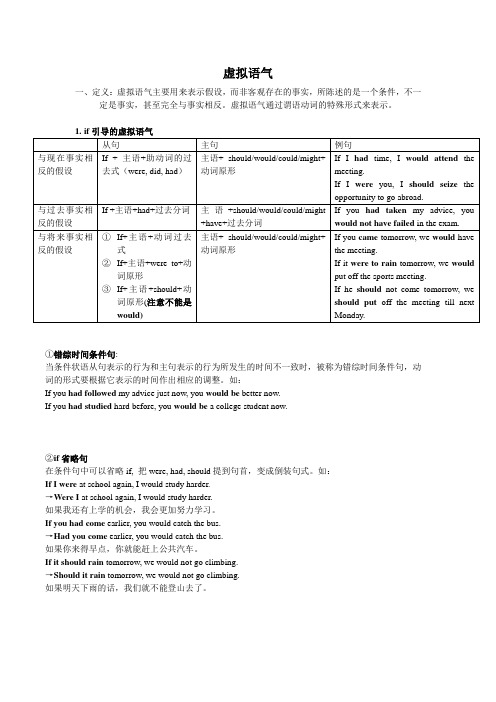
《小小设计师》教案一、教学目标:1. 让学生了解设计的基本概念和原则,培养学生的创新意识和审美能力。
2. 引导学生运用设计思维,解决实际问题,提高学生的实践能力。
3. 培养学生团队协作和沟通能力,提升学生的综合素质。
二、教学内容:1. 设计的基本概念:介绍设计的定义、目的和作用。
2. 设计的原则:讲解平衡、对比、重复、对齐和亲密性等设计原则。
3. 设计思维:引导学生运用设计思维,发现和解决实际问题。
4. 设计流程:介绍设计的基本流程,包括需求分析、创意构思、草图绘制、设计制作和评价反馈。
5. 设计工具:介绍常用的设计工具,如Photoshop、Illustrator和Sketch等。
三、教学方法:1. 讲授法:讲解设计的基本概念、原则和流程。
2. 案例分析法:分析经典设计案例,引导学生理解设计思维。
3. 实践操作法:让学生动手实践,运用设计工具进行实际操作。
4. 小组讨论法:分组讨论,培养学生的团队协作和沟通能力。
四、教学准备:1. 教材:《小小设计师》教程。
2. 电脑、投影仪和音响设备。
3. 设计工具软件。
4. 设计案例素材。
五、教学过程:1. 导入:通过展示经典设计案例,引发学生对设计的兴趣。
2. 讲解设计的基本概念和原则,让学生了解设计的重要性。
3. 讲解设计思维,引导学生运用设计思维解决实际问题。
4. 介绍设计流程,让学生掌握设计的基本步骤。
5. 讲解设计工具的使用,让学生学会运用设计工具进行实际操作。
6. 开展小组讨论,培养学生团队协作和沟通能力。
7. 布置课后作业,让学生巩固所学知识。
9. 对学生的作业进行评价,给予反馈意见。
10. 定期举办设计比赛,激发学生的创新潜能。
六、教学评价:1. 课堂表现:观察学生在课堂上的参与程度、提问回答情况和团队协作表现,给予相应的评价。
2. 课后作业:评估学生作业的质量,包括设计理念、创意构思和执行效果等方面。
3. 小组项目:对小组合作完成的Design Project 进行评价,关注学生的设计思路、创意实现和团队协作能力。
高中英语之虚拟语气详细讲解
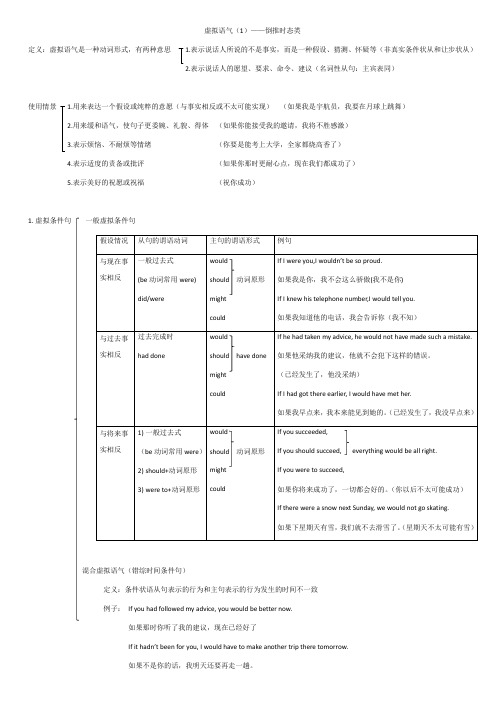
虚拟语气(1)——倒推时态类定义:虚拟语气是一种动词形式,有两种意思 1.表示说话人所说的不是事实,而是一种假设、猜测、怀疑等(非真实条件状从和让步状从)2.表示说话人的愿望、要求、命令、建议(名词性从句:主宾表同)使用情景 1.用来表达一个假设或纯粹的意愿(与事实相反或不太可能实现)(如果我是宇航员,我要在月球上跳舞)2.用来缓和语气,使句子更委婉、礼貌、得体(如果你能接受我的邀请,我将不胜感激)3.表示烦恼、不耐烦等情绪(你要是能考上大学,全家都烧高香了)4.表示适度的责备或批评(如果你那时更耐心点,现在我们都成功了)5.表示美好的祝愿或祝福(祝你成功)1.虚拟条件句一般虚拟条件句混合虚拟语气(错综时间条件句)定义:条件状语从句表示的行为和主句表示的行为发生的时间不一致例子:If you had followed my advice, you would be better now.如果那时你听了我的建议,现在已经好了If it hadn’t been for you, I would have to make another trip there tomorrow.如果不是你的话,我明天还要再走一趟。
If you had studied hard before,you would be a college student now.如果你以前努力学习的话,你现在就是大学生了。
省略+倒装当虚拟条件句的谓语动词中含有were,should,had时,if可以省略,并将were,should,had提前于句首,变为倒装句。
如果虚拟条件句是否定句,not 保留在原处If he should agree to go there, we should send him there.= Should he agree to go there,we should send him there.If she were there,she would agree with us.= Were she were, she would agree with us.If he had learnt about computers,we would have hired him.= Had he learnt about computers,we would have hired him.含蓄虚拟条件句定义:有时为了表达的需要,在虚拟语气中并不总是出现if引导的条件状语从句,而是通过其他手段来代替条件从句分类:1) but for....=(If it+be not for) ;without;Without your help ,we couldn’t have finished the work ahead of time.= But for your help,we couldn’t have finished the work ahead of time.= If it hadn’t been for your help,we couldn’t have finished the work ahead of time.没有你的帮助,我们不可能完成任务。
高三英语虚拟语气
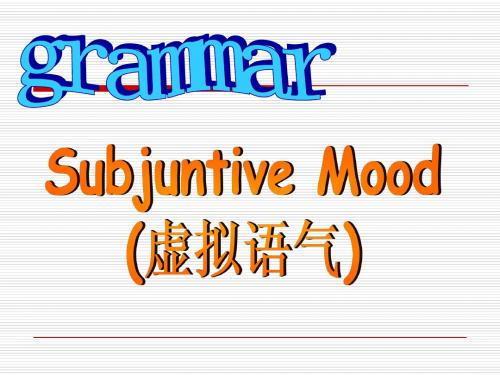
5. It’s (high) time句型:当It’s time后用 that从句时应该为: 主语+should+原形 主语+过去时 eg: 1) It’s time that you went to school. 2) It’s time that you should go to school.
色。
3) But that she was afraid, she would have said no.
7) If I ____ more time, I would have gone with him.
A. had B. had had C. have had D. would have
8) If he ___ to the teacher attentively, he ___ the answer to the problem now.
一、虚拟条件句: 条件状语从句是非真实情况时,要用虚拟语气。
If条件句 主句
与现在事实相反 与过去事实相反
did(be动词 would(或could, should, might) do 用were)
had done
would(或could, should, might) have done
did(were) 与将来事实相反或 should do would(或could, should, might) do 可能相反 were to do
Suggest 表示暗示,说明的意思时用真实语气
eg: Her expression suggested that she was angry.
He suggested that we (should) go to school at once.
高三英语虚拟语气知识点
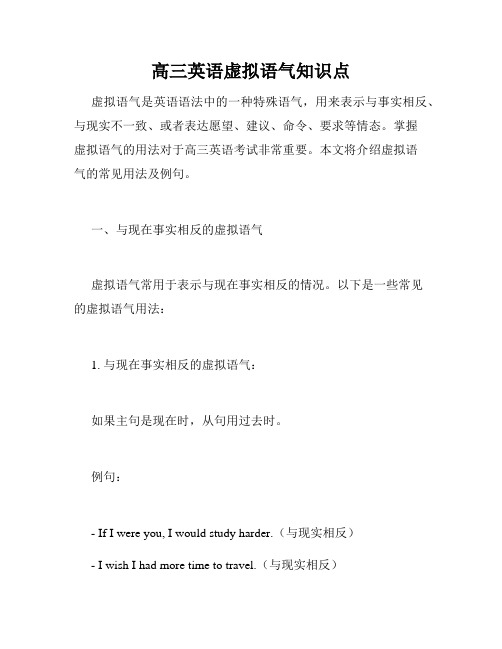
高三英语虚拟语气知识点虚拟语气是英语语法中的一种特殊语气,用来表示与事实相反、与现实不一致、或者表达愿望、建议、命令、要求等情态。
掌握虚拟语气的用法对于高三英语考试非常重要。
本文将介绍虚拟语气的常见用法及例句。
一、与现在事实相反的虚拟语气虚拟语气常用于表示与现在事实相反的情况。
以下是一些常见的虚拟语气用法:1. 与现在事实相反的虚拟语气:如果主句是现在时,从句用过去时。
例句:- If I were you, I would study harder.(与现实相反)- I wish I had more time to travel.(与现实相反)2. 表达建议、要求或命令等的虚拟语气:主句用“should”或“ought to”引导,从句用动词原形。
例句:- It is necessary that she should arrive on time.(建议)- He demanded that they leave immediately.(命令)二、与过去事实相反的虚拟语气虚拟语气还可以用来表示与过去事实相反的情况。
以下是一些常见的虚拟语气用法:1. 与过去事实相反的虚拟语气:如果主句是过去时,从句用过去完成时。
例句:- If he had studied harder, he would have passed the exam.(与过去事实相反)- I wish I hadn't eaten so much.(与过去事实相反)2. 表达愿望、建议或命令等的虚拟语气:主句用“should”或“ought to”引导,从句用动词原形或过去时。
例句:- It is high time that he applied for a job.(建议)- I wish he would stop talking.(愿望)三、与将来事实相反的虚拟语气虚拟语气还可以用来表示与将来事实相反的情况。
以下是一些常见的虚拟语气用法:1. 与将来事实相反的虚拟语气:如果主句是将来时,从句用过去完成时。
高考英语必考虚拟语气考点来,你都会吗?

高考英语必考虚拟语气考点来,你都会吗?虚拟语气又称假设语气,是谓语动词的一种形式,表示说话人叙述的内容与事实相反,在现实中并不存在,或实现的可能性很小(动作或状态不是客观存在的事实,而是说话人的主观愿望、假设或推测等)。
If I were a bird, I could fly in the air. 如果我是一只小鸟,我就能在空中飞行。
I wish it were spring all the year round. 但愿四季如春。
May good luck be yours! 祝你好运!考点聚焦1、虚拟语气用于条件状语从句中(常出题点)(1)表示与现在事实相反的假设:条件状语从句中的谓语动词用“过去式(be动词的过去式用were)”,而主句中的谓语动词用“would / should/ could / might + 动词原形”。
如:If I were a boy, I would join the army.If she had time, she should go with you.(2)表示与过去的事实相反:条件状语从句中的谓语动词用过去完成时,主句中的谓语动词则用“would / should / might / could + have +过去分词”。
如:If he had taken my advice, he would have succeeded in the competition.(3)表示与将来事实相反: 条件状语从句中的谓语动词一般过去时或should/were to/did + 动词原形,而主句中的谓语动词则用would / should/could might + 动词原形。
如:If it were to rain tomorrow, the football match would be put off.If it should rain, the crops could be saved.If I were to do the work, I should do it in a different way.Note: 三种变化形式1.错综条件句:虚拟条件句中的主句和从句涉及的动作发生的时间不一致,这时主句和从句的谓语形式应按照各自动作发生的实际时间来表达。
高中英语高考语法知识整理复习(虚拟语气+倒装句)

高考英语虚拟语气一、虚拟条件句中的虚拟语气1、表示与现在事实相反的情况从句:If+主语+did (be动词用were)主句:主语+ should/would/might/ could + doIf I were you, I would take an umbrella.如果我是你,我会带把伞。
(事实:我不可能是你)If I knew his telephone number, I would tell you.如果我知道他的电话号码,我就会告诉你。
(事实:不知道)If there were no air or water, there would be no living things on the earth.如果没有水和空气,地球上就不会有生物。
(事实:地球上既有空气也有水)2、表示与过去事实相反的情况从句:If+主语+ had + done主句:主语+should/would/might/could+have doneIf I had got there earlier, I should/would have met her.如果我早到那儿,我就会见到她(事实:去晚了)。
If he had taken my advice, he would not have made such a mistake.如果他听我的劝告的话,就不会犯这样的错误了。
(事实:没有听我的话)3、表示与将来事实相反的情况从句:①if+主语+were to do②if+主语+should+do③if+主语+过去式(be动词用were)主句:主语+should/would/might/could+doIf he should come here tomorrow, I would talk to him.如果他明天来这儿的话,我就跟他谈谈。
(事实:不可能来)If there were a heavy snow next Sunday, we would go skating.如果下周日下大雪,我们就去滑冰。
高考英语语法——虚拟语气

高考英语语法之虚拟语气(一)语气的种类:英语句子中谓语动词的语气有四种:1. 陈述语气(The Indicative Mood)陈述语气用于直截了当地陈述事实、描述状态:He has publishedquite a number of essays this year .他今年已发表了好几篇论文。
2. 祈使语气(The Imperative Mood)祈使语气用于提出请求、命令、建议或是劝告等:Wait outside untilyou are asked . 请在外面等候,请你进再进去。
Let's just take abreak, shall we ? 我们休息一会儿,好吗?3. 疑问语气( the interrogative mood ) :用来提出问题Where are you from?4. 虚拟语气(The Subjunctive Mood)虚拟语气用于表示主观愿望和假设的虚拟情况。
虚拟语气不太顾及事实的存在,它表现出说话人的主观因素比较多。
所以说话人所讲的内容往往是与事实相反的;或是其实现的可能性微乎其微,甚至于没有实现的可能性。
当然,有时为了使说话的语气客气、缓和、委婉,也使用虚拟语气。
If I had moremoney, I would buy a bigger apartment.我要是有再多一点钱,我就买一套更大一些房子。
(二) 虚拟语气的种类:虚拟语气用来表示说话人的主观愿望或假想,所说的是一个条件,不一定是事实,或与事实相反。
虚拟语气在条件句中应用比较多;条件句可分为两类,一类为真实条件句,一类为非真实条件句。
非真实条件句表示的是假设的或实际可能性不大的情况,故采用虚拟语气。
1.真实性条件句①真实条件句用于陈述语气,假设的情况有可能发生,各种结构如下:条件从句主句一般现在时 shall/will + 动词原形祈使句情态动词一般现在时If he comes, hewill bring his violin. 如果他来,会带小提琴来的。
高三英语虚拟语气试题答案及解析
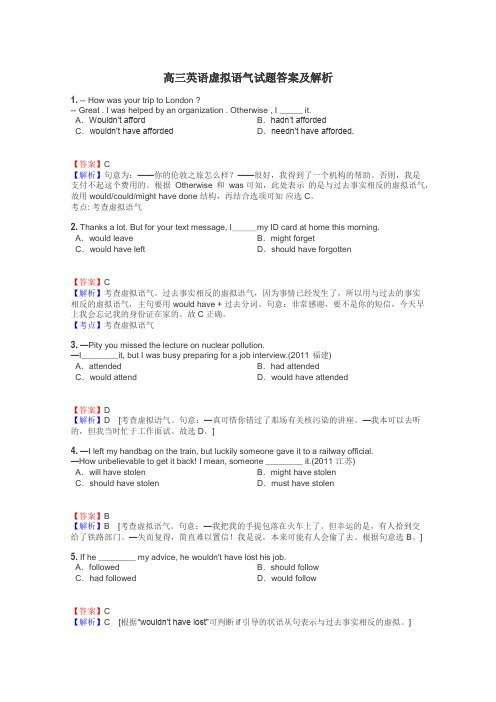
高三英语虚拟语气试题答案及解析1. -- How was your trip to London ?-- Great . I was helped by an organization . Otherwise , I _____ it.A.Wouldn’t afford B.hadn’t affordedC.wouldn’t have afforded D.needn’t have afforded.【答案】C【解析】句意为:——你的伦敦之旅怎么样?——很好,我得到了一个机构的帮助。
否则,我是支付不起这个费用的。
根据Otherwise 和was 可知,此处表示的是与过去事实相反的虚拟语气,故用would/could/might have done 结构,再结合选项可知应选C。
考点: 考查虚拟语气2. Thanks a lot. But for your text message, I___my ID card at home this morning.A.would leave B.might forgetC.would have left D.should have forgotten【答案】C【解析】考查虚拟语气。
过去事实相反的虚拟语气,因为事情已经发生了,所以用与过去的事实相反的虚拟语气,主句要用would have + 过去分词。
句意:非常感谢,要不是你的短信,今天早上我会忘记我的身份证在家的。
故C正确。
【考点】考查虚拟语气3.—Pity you missed the lecture on nuclear pollution.—I________it, but I was busy preparing for a job interview.(2011·福建)A.attended B.had attendedC.would attend D.would have attended【答案】D【解析】D[考查虚拟语气。
高中英语虚拟语气(绝对全)

If my brother were here, everything would be all right. 要是我哥哥在这儿,一切都没问题虚拟语气表示所说的话只是一种主观愿望、假设或建议等。
虚拟语气的重点是:虚拟语气的特殊形式,即用来表示要求、建议、命令、提议、意愿等的主语从句、宾语从句、表语从句和同位语从句中的虚拟形式,含蓄条件句中的虚拟语气和表示愿望的虚拟形式等。
(一)虚拟语气的常见句型●与现在事实相反的虚拟语气与现在相反的虚拟语气的结构为:条件句动词为were或动词的过去式,主句为would/should/could/might+动词原形了。
If you had taken my advice,you wouldn't (couldn’t) have failed in the exam. 如果你按●与过去事实相反的虚拟语气与过去相反的虚拟语气的结构为:从句用had+过去分词,主句用would/should/could/might+have done照我的建议去做,你一定不会(不可能)考试不及格。
●与将来事实相反的虚拟语气If it were Sunday tomorrow, I should (would,could,might) go to see my grandmother. 与将来相反的虚拟语气的结构为:从句谓语动词为动词过去式或“should+动词原形”或“were to+动词原形”,主句为would/could/might +动词原形如果明天是星期天,我就(可能)去看望我奶奶。
If it were to snow this evening, they would not go out. 如果今晚下雪,他们将不出去了。
●省略if形式的虚拟语气有时条件从句中的动作和主句中的动作发生的时间不一致(表示错综时间的虚拟语气),省略连词if。
在书面语中,如果虚拟条件从句中有were,had 或should,可以把if省略,把这几个词放到主语之前,构成主谓倒装。
高考英语中虚拟语气的用法和注意点是什么
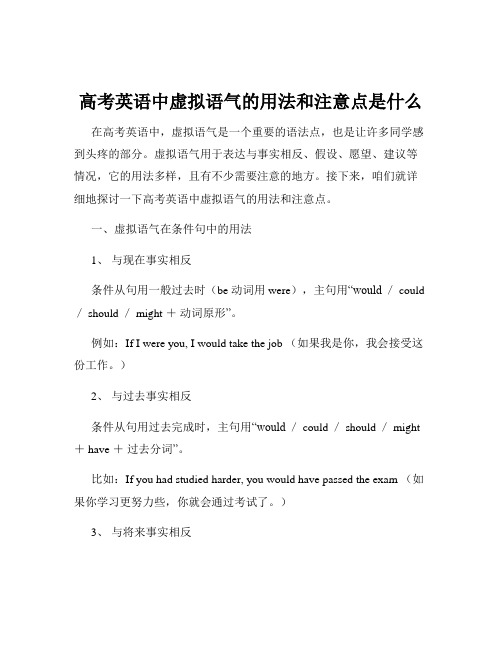
高考英语中虚拟语气的用法和注意点是什么在高考英语中,虚拟语气是一个重要的语法点,也是让许多同学感到头疼的部分。
虚拟语气用于表达与事实相反、假设、愿望、建议等情况,它的用法多样,且有不少需要注意的地方。
接下来,咱们就详细地探讨一下高考英语中虚拟语气的用法和注意点。
一、虚拟语气在条件句中的用法1、与现在事实相反条件从句用一般过去时(be 动词用 were),主句用“would / could / should / might +动词原形”。
例如:If I were you, I would take the job (如果我是你,我会接受这份工作。
)2、与过去事实相反条件从句用过去完成时,主句用“would / could / should / might + have +过去分词”。
比如:If you had studied harder, you would have passed the exam (如果你学习更努力些,你就会通过考试了。
)3、与将来事实相反条件从句有三种形式:① should +动词原形;② were to +动词原形;③一般过去时。
主句用“wou ld / could / should / might +动词原形”。
举个例子:If it should rain tomorrow, we would stay at home (要是明天下雨,我们就待在家里。
)二、虚拟语气在宾语从句中的用法1、 wish 后的宾语从句表示与现在事实相反,用一般过去时;表示与过去事实相反,用过去完成时;表示与将来事实相反,用“would / could +动词原形”。
例如:I wish I were as tall as you (我希望我和你一样高。
)2、表示“建议、要求、命令”等动词后的宾语从句这类动词有suggest(建议)、advise(建议)、insist(坚持要求)、order(命令)、demand(要求)等,从句谓语用“should +动词原形”,should 可以省略。
人教版高三英语课件语法虚拟语气
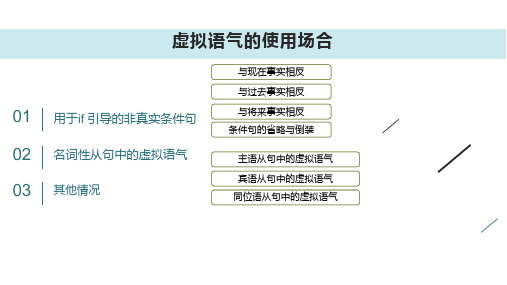
If I _h_a_d__n_o_t_b_e_e_n_ busy last night, I w__o_u_l_d_h__a_v_e_g_o_n_e_ to see the film with you.
If he _h_a_d_d_r_iv_e_n_ more carefully,
he __w__o_u_ld__n_o_t__h_a_v_e_h__a_d_ the car accident yesterday.
场景:泼皮王二又过来找老板赊账,从来就没还过。
王二:老板,来个哈喽kitty 公仔!明天给钱你啊! 老板:(满脸堆笑)好好好!!!
(内心:我宁愿你现在就把钱给了!) I would rather you paid me now.
场景:老王小舅子过来找老王,但是这个星期他超忙,没时
间招待他。所以他说:我宁愿你上周来。(上周来,与过去
主句的谓语形式
现在 V+ ed (were)
would/could/should/ might +V (原)
过去
had done
would/could/should/ might+have+p.p.
1. V. + ed.
未来
2. should+ V.(原) 3. were to do
would/could/should /might +V.(原)
2.2 虚拟语气在名词性从句中的用法(would rather that)
现在: 过去时 2. would rather that 过去: 过去完成时
未来: 过去时 ★ I would rather you paid me now. ★ I would rather I hadn’t come yesterday. ★ I would rather you came tomorrow.
高考英语语法:虚拟语气
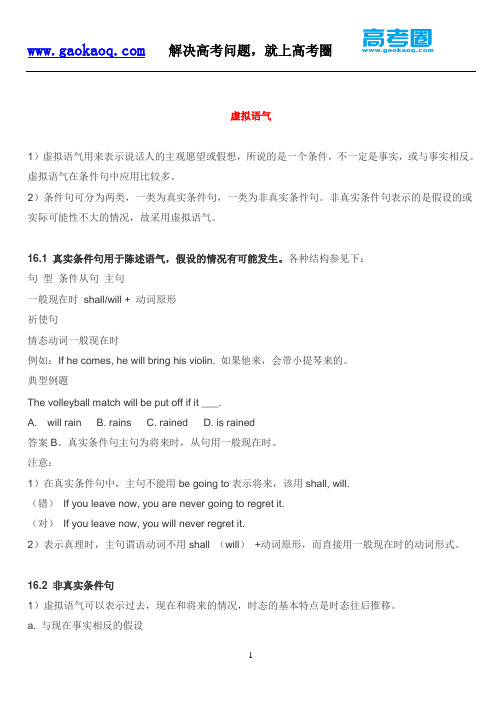
虚拟语气1)虚拟语气用来表示说话人的主观愿望或假想,所说的是一个条件,不一定是事实,或与事实相反。
虚拟语气在条件句中应用比较多。
2)条件句可分为两类,一类为真实条件句,一类为非真实条件句。
非真实条件句表示的是假设的或实际可能性不大的情况,故采用虚拟语气。
16.1 真实条件句用于陈述语气,假设的情况有可能发生。
各种结构参见下:句型条件从句主句一般现在时shall/will + 动词原形祈使句情态动词一般现在时例如:If he comes, he will bring his violin. 如果他来,会带小提琴来的。
典型例题The volleyball match will be put off if it ___.A.will rainB. rainsC. rainedD. is rained答案B。
真实条件句主句为将来时,从句用一般现在时。
注意:1)在真实条件句中,主句不能用be going to表示将来,该用shall, will.(错)If you leave now, you are never going to regret it.(对)If you leave now, you will never regret it.2)表示真理时,主句谓语动词不用shall (will)+动词原形,而直接用一般现在时的动词形式。
16.2 非真实条件句1)虚拟语气可以表示过去,现在和将来的情况,时态的基本特点是时态往后推移。
a. 与现在事实相反的假设条件从句主句一般过去时(be用were)should(would)等+动词原形例如:If they were here, they would help you. 如果他们在这儿,会帮助你的。
含义:They are not here, they can’t help you.b. 与过去事实相反的假设条件从句主句过去完成时should(would)等+ have+ 过去分词例如:If he had come yesterday, I should / would have told him about it.如果他昨天来的话,我会把这件事告诉他的。
高考英语:虚拟语气考点必背
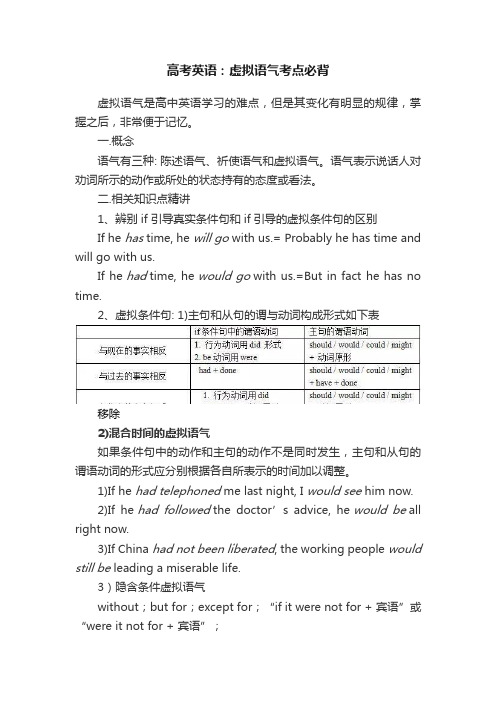
高考英语:虚拟语气考点必背虚拟语气是高中英语学习的难点,但是其变化有明显的规律,掌握之后,非常便于记忆。
一.概念语气有三种: 陈述语气、祈使语气和虚拟语气。
语气表示说话人对劝词所示的动作或所处的状态持有的态度或看法。
二.相关知识点精讲1、辨别if 引导真实条件句和if引导的虚拟条件句的区别If he has time, he will go with us.= Probably he has time and will go with us.If he had time, he would go with us.=But in fact he has no time.2、虚拟条件句: 1)主句和从句的谓与动词构成形式如下表移除2)混合时间的虚拟语气如果条件句中的动作和主句的动作不是同时发生,主句和从句的谓语动词的形式应分别根据各自所表示的时间加以调整。
1)If he had telephoned me last night, I would see him now.2)If he had followed the doctor’s advice, he would be all right now.3)If China had not been liberated, the working people would still be leading a miserable life.3)隐含条件虚拟语气without;but for;except for;“if it were not for +宾语”或“were it not for + 宾语”;But that + 从句;主句谓语用虚拟语气,时态变化同上表。
4)倒装省略句如果虚拟语气的条件从句谓语动词中含有were, had, should,could有时可将if省去,而将条件从句的主语置于were, had, should, could之后。
高考英语语法专项虚拟语气的用法
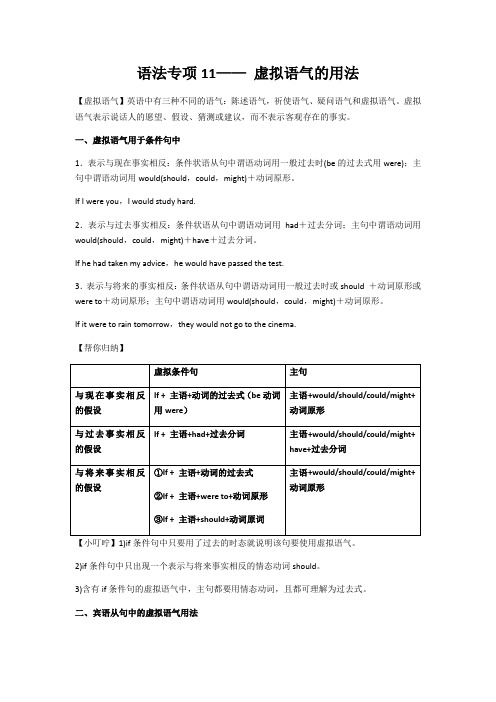
语法专项11——虚拟语气的用法【虚拟语气】英语中有三种不同的语气:陈述语气,祈使语气、疑问语气和虚拟语气。
虚拟语气表示说话人的愿望、假设、猜测或建议,而不表示客观存在的事实。
一、虚拟语气用于条件句中1.表示与现在事实相反:条件状语从句中谓语动词用一般过去时(be的过去式用were);主句中谓语动词用would(should,could,might)+动词原形。
If I were you,I would study hard.2.表示与过去事实相反:条件状语从句中谓语动词用had+过去分词;主句中谓语动词用would(should,could,might)+have+过去分词。
If he had taken my advice,he would have passed the test.3.表示与将来的事实相反:条件状语从句中谓语动词用一般过去时或should +动词原形或were to+动词原形;主句中谓语动词用would(should,could,might)+动词原形。
If it were to rain tomorrow,they would not go to the cinema.【帮你归纳】【小叮咛】1)if条件句中只要用了过去的时态就说明该句要使用虚拟语气。
2)if条件句中只出现一个表示与将来事实相反的情态动词should。
3)含有if条件句的虚拟语气中,主句都要用情态动词,且都可理解为过去式。
二、宾语从句中的虚拟语气用法1. 在wish后的宾语从句中,表示与现在或过去的事实相反,或对将来的主观愿望,从句中通常用虚拟语气。
从句中谓语动词的构成形式为:1)表示对现在情况的虚拟,从句中谓语动词用过去式(be动词一般用were)。
I wish it were spring now. 我希望现在是春天。
2)表示对过去情况的虚拟,从句中谓语动词常用had+过去分词。
I wish he had come yesterday.我希望他昨天能来。
高中英语语法-虚拟语气全总结
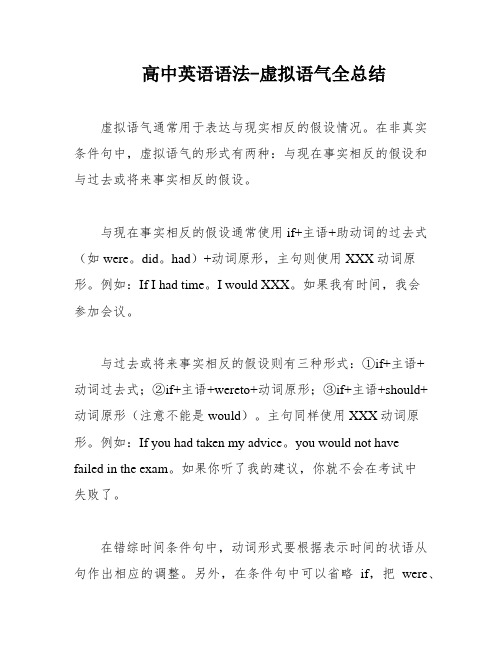
高中英语语法-虚拟语气全总结虚拟语气通常用于表达与现实相反的假设情况。
在非真实条件句中,虚拟语气的形式有两种:与现在事实相反的假设和与过去或将来事实相反的假设。
与现在事实相反的假设通常使用if+主语+助动词的过去式(如were。
did。
had)+动词原形,主句则使用XXX动词原形。
例如:If I had time。
I would XXX。
如果我有时间,我会参加会议。
与过去或将来事实相反的假设则有三种形式:①if+主语+动词过去式;②if+主语+wereto+动词原形;③if+主语+should+动词原形(注意不能是would)。
主句同样使用XXX动词原形。
例如:If you had taken my advice。
you would not have failed in the exam。
如果你听了我的建议,你就不会在考试中失败了。
在错综时间条件句中,动词形式要根据表示时间的状语从句作出相应的调整。
另外,在条件句中可以省略if,把were、had、should提到句首,变成倒装句式。
例如:Were I at school again。
I would study harder。
如果我还有上学的机会,我会更加努力研究。
Had you arrived earlier。
you would have caught the bus.If it rains tomorrow。
XXX climbing.What would you do with a n dollars?We couldn't have finished the work ahead of time without your help.Otherwise。
I would have taken part in the sports meeting.XXX me of your birthday。
or else I would have known nothing about it.A man who s drinking water would be dead in about seven days.I might have been XXX assistance。
英语 高考 虚拟语气用法最全总结

B. is busy
C. had been busy
D. will be busy
I forget where I read the article,or I______it tomorrow. A. will show
B. would show
C. am going to show
D. am s条件句中
虚拟条件从句(If)
与现在事实相 反的假设
主语+did/were
主 句
主语+should / would/
could / might + do
与过去事实相 反的假设
主语+ had done
主语+ should / would/ could / might +
have done
1.I was ill that day. Otherwise, I would have taken part in the sports meeting.
=If I hadn‘t been ill that day, I would have taken part in the sports meeting.
________ it rain tomorrow, we would have to put off the visit to the Yang Pu Bridge.
A.Were C.Would B. Should D. Will
This printer is of good quality.If it____break
— Why didn’t you buy it?
— I ______ but I didn’t have the money.
高三英语一轮复习写作专题:委婉动人的“虚拟语气”
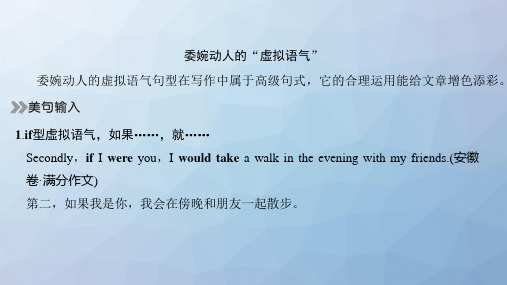
2.wish型虚拟语气,希望…… Besides,I wish there wouldn’t be too many students in a class. 另外,我希望一个班不会有太多的学生。(全国卷Ⅰ·满分作文)
3.as if/though型虚拟语气,好像……
Everything in my childhood crowded upon my mind as if/though they had just happened. 童年的一切一下子涌入我的大脑,仿佛刚刚发生似的。
choice.I wish 1.__I _c_o_u_ld__b_e_co_m__e_a__d_u_s_tm__a_n (我能成为一名环卫工人) because 2.__I_w_i_s_h_I_ _c_o_u_l_d_m__a_k_e_o_u_r_c_i_ty__a_m__o_re__b_e_a_u_ti_fu_l_p_l_a_c_e_t_o_l_iv_e__in__ (我希望我能把我们的城市变成一个 更美的居住的地方).If I were a dustman,3.__I_w_o_u_l_d_m__a_k_e_o_u_r_c_i_ty__c_le_a_n_e_r_ (我会让我们的
11
VIP用户有效期内可使用共享文档下载特权下载任意下载券标价的文档(不含付费文档和VIP专享文档),每下载一篇共享文档消耗一个共享文档下载特权。
年VIP
月VIP
连续包月VIP
享受100次共享文档下载特权,一次发放,全年 赠送的共享文档下载特权自VIP生效起每月发放一次,每次发放的特
内有效
权有效期为1个月,发放数量由您购买的VIP类型决定。
4.If _y_o_u__h_a_d_c_o_m__e_e_a_rl_ie_r_,you _w__o_u_ld_/_c_o_u_ld__h_a_v_e_c_a_u_g_h_t_ the train. 如果你来早一点,就会赶上那班列车了。
- 1、下载文档前请自行甄别文档内容的完整性,平台不提供额外的编辑、内容补充、找答案等附加服务。
- 2、"仅部分预览"的文档,不可在线预览部分如存在完整性等问题,可反馈申请退款(可完整预览的文档不适用该条件!)。
- 3、如文档侵犯您的权益,请联系客服反馈,我们会尽快为您处理(人工客服工作时间:9:00-18:30)。
情态动词I can , could (could 是can的过去式)1)表示“能力”,“许可”,“可能性”,“惊异”。
He can sing. (能力)He could sing when he was young.(能力)You can go now. (许可)At that time, I didn’t think the story could be true. (可能性)What on earth can this mean? (惊异)2) could 可以代替can,表示语气较为婉转Could you wait for me at the school gate?3) can和be able to 都表示能力,be able to 形式较多,并且表示成功地做某事。
He was able to flee Europe before the war broke out.= He managed to flee Europe before the war broke out= He succeeded in fleeing ----We shall be able to finish the work next week.4) 表示推测:否推:can’t be --, can’t have done--; 疑问推测:Can he be---?You look quite young. You can’t be forty. ( are you?)The light is still on. They can’t have gone to bed. (have they?)Can you be forty?What can they be talking about? (会在讨论什么呢?)Can he have written the book alone? (这本书会是他独自写的吗?)5) 虚拟could have done (本可以,原可以做)You could have come.6) 用在目的状语从句中He got up early in order that/ so that he could / might catch the early bus.II. may , might1)表示允许或征询对方许可,有“可以”意思,否定形式为may not (可以不),但在表示“不可以”,“禁止”,“阻止”时,用must not.You may go now.May I watch TV after supper?Yes, you may. No, you mustn’t. 或No, you may not. No, you’d better not.在请求对方许可时,可用Might I---? 表示更礼貌。
2)表示可能性,有“或许”,“可能”意思。
可能性推测:may /might do---/ may/might have done---He may be right.He may/ might come today.He may/ might have missed the train.III. must, have to, ought to , should1)must 表示“必须”,“应该”,否定式must not, 不应该,不准,禁止。
Everybody must obey the rules.You mustn’t speak like that to your mother.Must I be home after 8 o’clock?Yes, you must. No, you needn’t.2)must 表示肯定推测(一定,必定,准是)must be/ must have doneYou must be hungry after the long walk, aren’t you ?He must have gone to Beijing, hasn’t he?He must have gone to the cinema last night, didn’t he?3) must 常有“偏偏” 的意思Why must you interrupt me now and then when I was talking?我在讲话时你为什么偏偏要不时地打断我?The telephone must ring when I was busy in the kitchen.我在厨房忙, 偏偏电话铃响了.4) must侧重说话人的主观色彩,而have to侧重表示客观情况限制不得不做的事We must empty the room so that we can get it painted soon.我们必须把房间搬空, 这样我们就能马上油漆.We have to empty the room because a couple will move in soon.我们得把房间搬空, 因为有一对夫妇户马上要搬进来.don’t have to do ---没有必要做--- You don’t have to worry about that.5) ought (not) to do --- 应该做---= should (not) do—You ought to/ should follow your father’s advice.should/ought to have done 该做而没做(含有责备之义)shouldn’t /oughtn’t to have done 不该做却做了(含有责备之义)He ought not to have kept us waiting so long.6) should 表示“万一”万一明天下雨,我们就不去动物园了.If it should rain tomorrow, we would not go to the zoo.Please take your umbrella in case it rains/ it should rain.7) 用在某些虚拟句型中suggest / order/ require / insist that sb. (should ) do—It is important/ necessary / essential --- that sb. (should ) do---8) should 有竟然的意思,还有推测的意思。
You can’t imagine that a well-behaved gentleman should be so rude to a lady. Mother should be back by now. 妈妈现在应该回来了。
IV. shall1)用于第二,三人称表示说话人的意愿, 如命令,警告, 威胁,允诺(陈述句)You shall have a new bike if you pass the exam. 允诺You shall do as I told you to. 命令2)在疑问句中,shall用来征询对方意见或请求指示,用于第一、三人称。
Shall he open the window?Where shall I wait for you?3)肯定句中,用于第一人称,表将来。
I will/shall telephone her tonight.V. will, would1) will 表示意志,意愿,用于各种人称。
I will tell you all about it.He won’t go.2)will 在疑问句中用于第二人称,表示征求对方的意愿,或向对方提出请求。
Will you go with me? Won’t you sit down?3)表示习惯性动作,有“总是”,“惯于”之义,(有一种发展趋势)Fish will die out of water.He will talk for hours if you give him the chance.The door won’t open.4)would 表示过去的意志,意愿They said that they would help us.5) would 比will婉转(指的是现在时间)I would like to see your new car.Would you like to see a film? Yes, I’d like to. Thanks. I am afraid I won’t be able to.6)过去的习惯动作When he was young, he would go swimming. ( used to)VI. need, dare既可以作情态动词又可以作实义动词1) need 在肯定句中只用作行为动词,否定句和疑问句中都可。
I need to go there at once. (行为动词)I need not do so.=I don’t need to do so.=I don’t have to do so.Need you do so?=Do you need to do so?Yes, I must. No, I needn’t. Yes, I do. No, I don’t.didn’t need to do=didn’t have to doneedn’t have done 本不必做----(言下之义做了)2)dare在肯定句中只用作行为动词,作为情态动词用于否定句和疑问句和从句中。
I dare to go home alone at mid-night.I dare not do so.= I don’t dare (to ) do so.If he dare do it, I will call for the police.VII. 总结情态动词的完成式。
needn’t have done 本来不必做却做了must have done 一定已经做了某事should/ought to have done 该做而没做shouldn’t /oughtn’t have done 不该做却做了could have done 本可以做却没做couldn’t have done 不可能做了某事might have done 也许做了某事。
